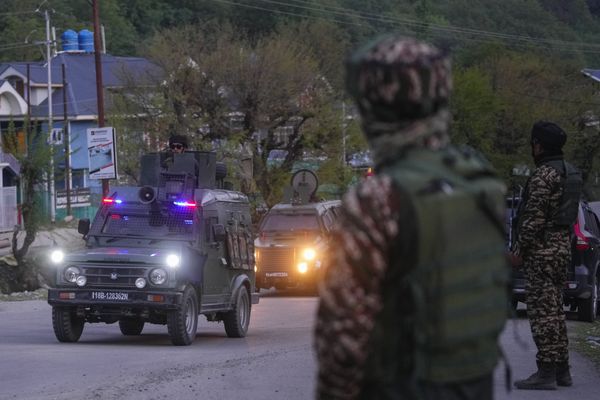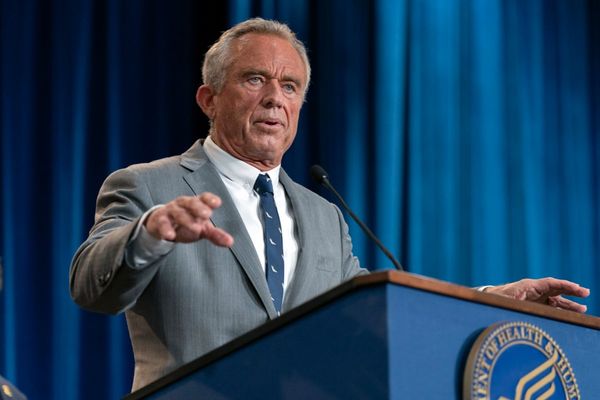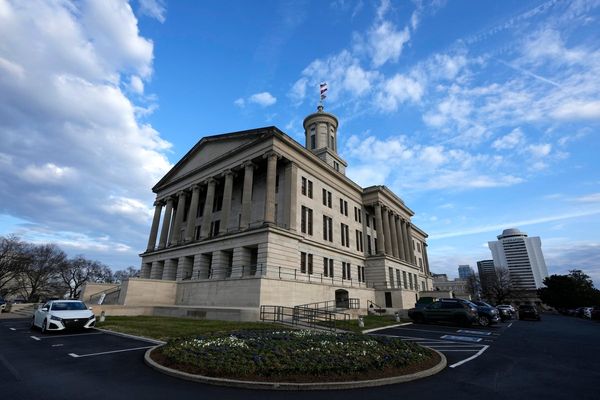
Scott Morrison has called for Russia to be treated as a “pariah state” over the invasion of Ukraine, as Australia committed $70m to provide Ukraine with missiles and ammunition.
The Australian prime minister said on Tuesday that Russia should be diplomatically isolated and its membership of the G20 reconsidered, declaring “no one should have anything to do with them”.
With satellite images showing a Russian military convoy stretching for about 64km in an area north-west of Kyiv, Morrison also warned Australians against travelling to Ukraine to fight on either side of the war, describing it as a legally ambiguous “suicide mission”.
For days the Australian government has been signalling its willingness to fund the provision of lethal military equipment to Ukraine, but the details have been subject to talks with Nato partners.
After a meeting of cabinet’s national security committee in Canberra on Tuesday, Morrison said the government was committing $70m towards “both lethal and nonlethal defensive support for Ukraine”. The majority of that funding was for lethal support.
“We’re talking missiles, we’re talking ammunition, we’re talking supporting them in their defence of their own homeland in Ukraine and we will be doing that in partnership with Nato,” Morrison said.
But the prime minister did not provide details about what specific equipment was being provided or how it would be delivered, saying he did not want to “give the Russian government a heads-up about what’s coming their way”.
“Those anti-armour missiles are proving to be extraordinarily effective, so that is obviously a huge priority about where we will be directing particularly a lot of that initial investment.”
The announcement follows a warning from Russia’s foreign ministry on Monday that countries supplying lethal weapons to Ukraine would “bear responsibility” if they were used against Russian troops.
Asked whether the provision of lethal aid may make Australia a target for retaliation such as cyber-attacks, Morrison said it was in Australia’s interests to “stand up to bullies”.
He said the world was dividing between autocratic, authoritarian regimes and liberal democracies, and Australia could not be “absent” in standing up for its principles.
No state-sponsored cyber activity against Australia had been detected to date, but individuals and businesses should remain ready, Morrison added.
Morrison said Australia wanted to “impose the most significant costs on Russia that we possibly can” as “a clear warning to anyone else who would seek to engage in such unlawful acts of aggression and violence through an invasion of that nature”.
The Russian central bank increased interest rates to 20% from 9.5% after the rouble plunged up to 40% on Monday following sanctions from the US, the UK, Europe and others, which are likely to continue to expand.
Morrison said Australia was in talks with Indonesia – the host of this year’s G20 – about excluding Russia, although Morrison acknowledged it was a sensitive matter.
“I think there has been a very clear view expressed particularly by countries like Australia [and] G7 countries that this will need to be managed,” he said.
“They [Russia] have self-selected themselves as a pariah state, and that’s how they should be known all around the world, and no one should have anything to do with them, frankly, right around the world.”
Morrison said he believed Vladimir Putin had underestimated the strength of the international reaction to last week’s invasion of Ukraine, but predicted this would lead “to an even more violent response from Russia”.
The prime minister repeated his warnings against travelling to join the new legion for international volunteers that Ukraine’s government is assembling, saying the command structure was “totally unknown” so it was unclear whether it would be legal for Australians to join it.
Under the Criminal Code, it is an offence for an Australian to enter a foreign country to engage in hostile activity, unless “with the armed forces of the government of a foreign country”.
Morrison did not answer a specific question about whether the government was considering using separate powers to declare no-go zones in parts of Ukraine, in order to also prevent people from travelling to join Russia’s armed forces.
He said anyone travelling to Ukraine would “find themselves on the wrong end of some very, very violent attacks”, and added: “Others have described those sorts of things as suicide missions and that’s not an unreasonable assessment.”
The defence minister, Peter Dutton, said the situation was “going to become more and more difficult” as Russian forces approached Kyiv. Many people would die “unless President Putin changes the course he is on at the moment”, Dutton said.
On Tuesday the Russian embassy in Canberra argued the US and its European allies were responsible for the current crisis by backing the enlargement of Nato.
On Facebook the Russian embassy reposted a 2014 article in the Foreign Affairs journal that suggested the US and Europe should “create a prosperous but neutral Ukraine” rather than “exacerbate hostilities with Russia”.
The Australian government has received bipartisan support for its response to Russia’s actions, with less than three months remaining before the federal election is due to be held.
The Labor leader, Anthony Albanese, said he was “dismayed by the scenes from Ukraine” as people were “fighting against this aggression from Russia, which is totally unwarranted, totally unprovoked”.
“We support the strongest possible action by Australia, in partnership with the United States, with the United Kingdom, and with Nato, to make sure that we hold Vladimir Putin to account and that we express our solidarity with the people of Ukraine at this difficult time,” Albanese said on Tuesday.
Albanese signalled he would support further action if taken, including expelling Russian diplomats, but said he was not looking for a political dispute over the government’s response.
The Australian government is also offering an initial $35m to international organisations to support shelter, food and medical care, but said more assistance would be provided as humanitarian needs were better understood.







